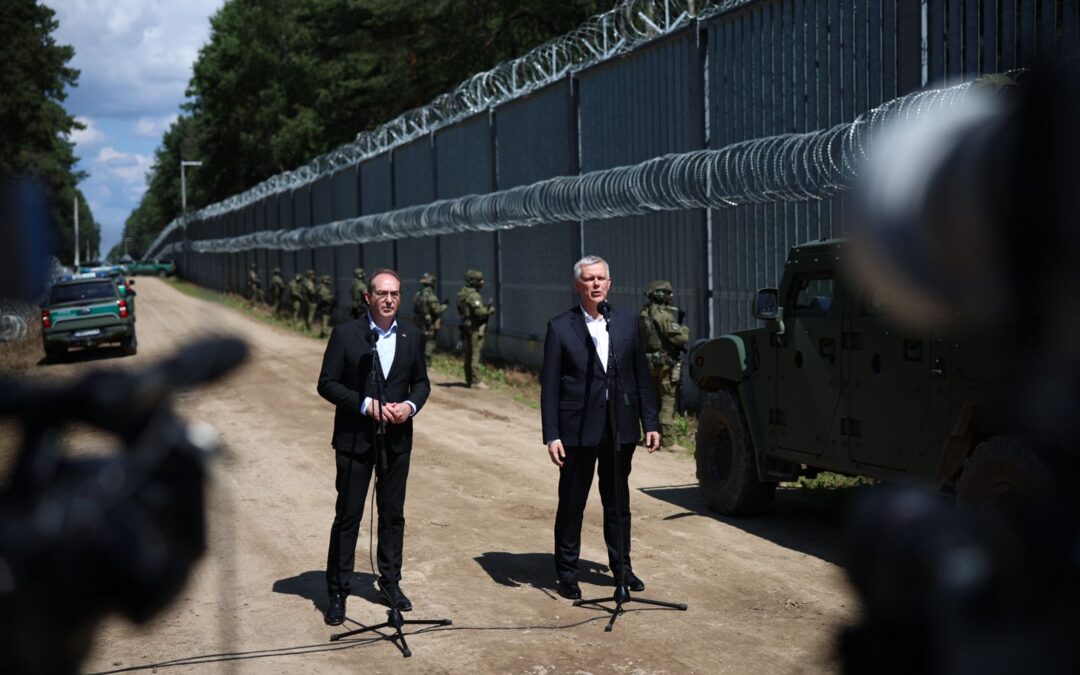Keep our news free from ads and paywalls by making a donation to support our work!

Notes from Poland is run by a small editorial team and is published by an independent, non-profit foundation that is funded through donations from our readers. We cannot do what we do without your support.
Germany’s interior minister, Alexander Dobrindt, has praised Poland’s actions in preventing illegal migration into the European Union on a visit to the Polish-Belarusian border. He has called for Warsaw to receive more financial support and “appreciation” from the EU for the work it is doing.
Dobrindt was invited to visit the border by his Polish counterpart, Tomasz Siemoniak, with the pair addressing the media in front of the heavy fortifications Poland has erected along the frontier.
“I want to show the German interior minister that the fight against illegal migration must take place at the external borders of the EU,” said Siemoniak. “We are doing everything to stop illegal migration right here.”
Minister @TomaszSiemoniak podczas konferencji na przejściu granicznym Połowce-Pieszczatka ⤵️
💬 W naszym przekonaniu kontrole prowadzone po stronie niemieckiej oraz po stronie polskiej służą wspólnej walce z nielegalną migracją. Jesteśmy jednak przekonani, że jedną z… pic.twitter.com/6RyEDBnKhy
— MSWiA 🇵🇱 (@MSWiA_GOV_PL) July 21, 2025
Since 2021, Belarus has been encouraging and assisting tens of thousands of migrants and asylum seekers – mainly from the Middle East, Asia and Africa – to try to cross its borders into Poland, Latvia and Lithuania. Those who do manage to cross usually then head westwards, to Germany in particular.
In 2023, Germany reintroduced controls on its border with Poland in an effort to prevent such migrants from entering. That has resulted in it sending back thousands of migrants to Poland after they tried to enter unlawfully.
Those measures have been strongly criticised by Poland, which argues efforts should instead focus on protecting the EU’s external borders rather than undermining freedom of movement within the European Schengen area.
Siemoniak today noted that Poland has spent around 2.6 billion zloty (€610 million) on securing its frontier with Belarus, where it has also deployed 11,000 border guards and troops.
“Our goal is to effectively combat illegal migration so that migrants do not enter Poland and subsequently Germany and other countries,” said the Polish minister. He added that, thanks to such efforts, around 98% of crossings are now prevented.
“We are convinced that one of the greatest values of the EU is freedom of travel and the absence of border controls, namely the Schengen zone, which has existed for 40 years,” continued Siemoniak.
He therefore pledged that, whenever Germany ends its controls on the Polish-German border, Poland will also withdraw the ones that it introduced two weeks ago
The Polish government has faced intense criticism in recent months from right-wing opposition parties over Germany’s practice of sending migrants who have entered unlawfully back to Poland. Warsaw, however, claims that the opposition has exaggerated the scale and nature of such returns.
Thousands have joined anti-immigration marches organised by the far-right Confederation party in dozens of Polish cities.
"We don't want Poland sharing the fate of western Europe," said the organisers. "The state is failing, so citizens are taking action" https://t.co/a6J8usjgML
— Notes from Poland 🇵🇱 (@notesfrompoland) July 19, 2025
Speaking alongside Siemoniak, Dobrindt said that it is “impressive what Poland is doing here on the EU’s borders with Belarus…to stop illegal migration”, reports Polsat News.
“It is important that, as the EU, we support Poland both financially and logistically, but also by expressing our appreciation for what Poland is doing at the EU’s external borders to combat illegal migration,” he added.
Regarding Poland’s recent move to introduce its own controls on the borders with Germany and Lithuania, Dobrindt said that Berlin “strongly supports the decision”, reports the Polish Press Agency (PAP).
But he added that Germany intends for internal EU border controls to be only “temporary” and that “our common goal is to eliminate them while simultaneously increasing the security of external borders everywhere in the EU”.
In the first week since restoring controls on its borders with Germany and Lithuania to prevent irregular migration, Poland has checked over 100,000 people seeking to cross, 60 of whom were refused entry https://t.co/9maL3bgvmv
— Notes from Poland 🇵🇱 (@notesfrompoland) July 14, 2025
In April, the European commissioner for internal affairs and migration, Magnus Brunner, also visited the Belarus border with Siemoniak. He thanked Poland for protecting the EU’s eastern frontier from “weaponised” migration, calling the country “Europe’s first line of defence”.
He also expressed support for Poland’s controversial decision to suspend the right for migrants to apply for asylum after crossing from Belarus, saying that it is “correct under EU law”.
Last year, the European Commission announced that it would allocate €170 million to countries neighbouring Russia and Belarus to help protect their borders from “hybrid threats”, in particular the “weaponisation of migrants”. Poland is set to receive €52 million, the biggest share from the pool.
Poland's recent decision to suspend asylum rights is "correct under European law", says the EU's migration commissioner.
During a visit to the Polish-Belarusian border, he thanked Poland for protecting the EU’s eastern frontier from “weaponised” migration https://t.co/4mKWXABhO2
— Notes from Poland 🇵🇱 (@notesfrompoland) April 26, 2025

Notes from Poland is run by a small editorial team and published by an independent, non-profit foundation that is funded through donations from our readers. We cannot do what we do without your support.
Main image credit: MSWiW/X

Daniel Tilles is editor-in-chief of Notes from Poland. He has written on Polish affairs for a wide range of publications, including Foreign Policy, POLITICO Europe, EUobserver and Dziennik Gazeta Prawna.



















